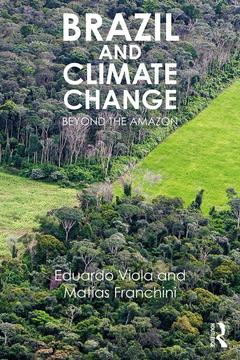Brazil and Climate Change Beyond the Amazon
Auteurs : Eduardo Viola, Franchini Matías

Climate change is increasingly a part of the human experience. As the problem worsens, the cooperative dilemma that the issue carries has become evident: climate change is a complex problem that systematically gets insufficient answers from the international system.
This book offers an assessment of Brazil?s role in the global political economy of climate change. The authors, Eduardo Viola and Matías Franchini expertly review and answer the most common and widely cited questions on whether and in which way Brazil is aggravating or mitigating the climate crisis, including: Is it the benign, cooperative, environmental power that the Brazilian government claims it is? Why was it possible to dramatically reduce deforestation in the Amazon (2005-2010) and, more recently, was there a partial reversion?
The book provides an accessible?and much needed?introduction to all those studying the challenges of the international system in the Anthropocene. Through a thorough analysis of Brazil in perspective vis a vis other emerging countries, this book provides an engaging introduction and up to date assessment of the climate reality of Brazil and a framework to analyze the climate performance of major economies, both on emission trajectory and policy profile: the climate commitment approach. Brazil and Climate Change is essential reading for all students of Environmental Studies, Latin American Studies, International Relations and Comparative Politics.
Preface 1. Climate Change and International Relations: Empirical and Theoretical Assessment 1.1 Introduction 1.2 The Aggravation of the Climate Crisis: Temperature Rise, Extreme Weather Events, Renewable Revolution and, the Emerging of the Geoengineering Option 1.3 The Paris Accord and the Rise of Climate Powers 1.4 The Climate Commitment Approach (CCA) 1.5 The Drivers of Climate Commitment 1.6 Final Considerations 2. Brazil in the International System: Underachieving (Environmental) Power and the Leadership Myth 2.1 Introduction 2.2 Brazil in the Global Carbon Cycle and the Planetary Boundaries 2.3 Brazil in the International System: Economy, Democracy, and Foreign Policy 2.4 Final Considerations 3. The Beginning: Brazil, the Climate Villain 3.1 Introduction 3.2 Emission Profile 1: Giant Irrational Deforestation 3.3 Domestic Climate Policy Profile 1: The Lack of Actions 3.4 Foreign Climate Policy Profile 1: A World Divided by Income: The Brazilian Contribution to the Climate Convention? (1992-2005) 3.5 Final Considerations: Low Climate Commitment, Amazon Disorders, and Strong Conservative Forces 4. The Rising: Brazil, the Developing Climate Leader? 4.1 Introduction 4.2 Emission Profile 2: Deforestation Control and Drastic Declining 4.3 Domestic Climate Policy Profile 2: Rapid and Intense Change 4.4 Foreign Climate Policy Profile 2: The Transition to Moderation and Activism 4.5 The Forces Behind Brazilian Climate Activism 4.6 Final Considerations: Medium Climate Commitment, Overcoming the Amazon Disorders, and the Rise of Reformist Forces 5. The Decline: Brazil, the Climate Negligent 5.1 Introduction 5.2 Emission Profile 3: The Return of High Emissions 5.3 Domestic Climate Policy Profile 3: Stagnation and Retraction 5.4 Foreign Climate Policy Profile 3: The Conservative Set-Back 5.5 The Drivers of the Decline 5.6 The Temer’s Administration: New Economic Policy, Old Conservative Persistence 5.7 Final Considerations: Low Climate Commitment, Amazon Neglect, and the Rise of Conservative Forces 6. The Future: Brazil and the Bases for a True Environmental/Climate Leadership 6.1 Summarizing the Three Periods 6.2 The Future of Climate Commitment in Brazil: Dealing with the Amazon Neglect 6.3 The Drivers of Climate Commitment in the Coming Years 6.4 The Bases for a True Brazilian Climate Leadership: Democracy, Economy, and International Insertion
Eduardo Viola is Full Professor of International Relations at the University of Brasilia, Senior Researcher at the Brazilian Council for Scientific Development and Coordinator of the Research Group of the International System in the Anthropocene. He has been a visiting professor at several universities, among them Stanford, Amsterdam, Notre Dame and Colorado. He is a member of several international scientific committees and the author of 8 books and more than 90 peer reviewed articles. His main areas of research are: Globalization and Governance; International System in the Anthropocene; International Political Economy of Energy/Climate Change; and Brazilian Foreign Policy.
Matías Franchini is a Postdoctoral Research Fellow at the Institute of International Relations at the University of Brasilia and a member of the International System in the Anthropocene and Climate Change Research Program. He was a visiting researcher at the Woodrow Wilson School of Princeton University. He holds a PhD. in International Relations from the University of Brasilia. He is the author of several publications in the areas of Global Governance, Latin American Studies and International Politics of Climate Change.
Date de parution : 10-2017
15.2x22.9 cm
Date de parution : 10-2017
15.2x22.9 cm
Thème de Brazil and Climate Change :
Mots-clés :
Brazilian Government; Eduardo Viola; Deforestation Control; Brazil; CBDR Principle; Brazilian Politics; LULUCF Sector; Climate Change; SEEG Data; Environmental Politics; Voluntary Mitigation Commitment; International Relations; Gdp Carbon Intensity; International Political Economy; Agri Business Sector; Latin American Politics; Mitigation Targets; Environmental Studies; Brazil Ministry; United Nations Framework Convention on Climate Change (UNFCCC); Paris Cop; Carbon Emissions; President Rousseff; Global Political Economy of Climate Change; Brazilian Emissions; Green House Gas (GHG) Emissions; Temer Administration; Deforestation; Climate Villain; Intergovernmental Panel on Climate Change (IPCC); Dilma Rousseff; Agriculture; Forestry and Other Land Use (AFOLU); Domestic Climate Policies; Principle of Common but Differentiated Responsibilities (CBDR); BAU Scenario; Intended Nationally Determined Contribution (INDC); Copenhagen Cop; Emerging Economies; Reformist Government; Low Carbon Economy; GHG Intensity; Climate Power; Cerrado Savanna; Paris Agreement; Carlos Minc; Amazon Forest; Climate Powers; Energy Politics; Cardoso Administration; Energy Studies; Global Climate Governance; Global Environmental Politics; Environmental International Political Economy; Environment and Development; Globalization and Governance; International Politics of Energy; Latin-American Studies; Brazilian Studies; Guy Edwards; J; Timmons Roberts; Kathryn Hochstetler; Marco Vieira; Arild Underdalt; Scott Mainwaring; David Held; Matías Franchini



